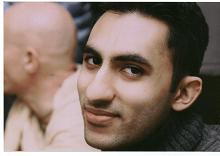Sri Sri Radha Govinda Mandir (Brooklyn, NY)
Sunday Feast Lecture – September 10, 2006
Defeating the terrorists within the heart
(Please note: To retain the mood of the class, I have presented it in the first person. However, this is a summary re-telling of Radhanath Swami's class, based on notes I took while Maharaj was speaking. It is not a verbatim transcript of the lecture. In order to convert from spoken to written English, I have also made small edits where necessary.)
Usually when I come here, I’m unprepared and I give some spontaneous purport to Ramabhadra Prabhu’s announcement. And in his announcements, there is always a vast diversity to choose from. Today, he was speaking about watering the seed of bhakti, within own hearts and the hearts of others.
According to our scriptures, pure love of God, and of all living beings, is dormant within the hearts of everyone. To know God, to love God, and to be a perfect instrument in the hands of God, is everyone’s innate potential. Krishna tells in the Bhagavad-gita (15.7): mamaivamso jiva-loke jiva-bhutah sanatanah. All living entities are part and parcel of Krishna. Qualitatively, we are of the same nature as God – eternal, full of knowledge, full of bliss. Quantitatively we are like a sunray compared to the sun – just a very tiny particle. But the potential of each part is unlimited when it is connected to the supreme source of all power, Krishna or God.
As the Lord is supremely independent, as part of God we also have independence. And according to the choices we make at every moment, we create a particular state of consciousness, which evokes particular actions and words, which then creates our destiny for the future.
How is it possible for a pure soul, constitutionally the servant of God, to engage in abominable activities, and justify it in the name of doing good? It is our choice: to live in harmony, or to live according to our own egoistic aspirations.
Within the material manifestation there are three modes, which are like ropes that bind us when we choose to come under their influence. How powerful are these ropes? Lust, anger, envy, illusion – these are all symptoms of the essential disease which is the cause of all our suffering. That disease is forgetfulness of our eternal relationship with God. As soon as we forget, we start acting in various selfish ways for our own happiness. We become bound by these ropes; we become mad, intoxicated. Lord Rsabhdeva has said that when we forget God, we all become mad to different degrees.
For instance, when a person is affected by envy, what it can do to destroy all good sense? The false ego is a highly intoxicating substance. When a person is very deeply intoxicated, they forget who they are or what to do. They can become prone to violence and can act without regret or remorse.
Tomorrow is September 11th, the date where people all over the world will observe what happened here in New York City. Why? How is it possible that a spirit soul that is an eternal lover of God can become so corrupted, so polluted, that it can plot to murder thousands of innocent people, carry the plot through, and become proud that “We have done great things in the name of God.” This is the power of the human mind – it can justify anything under the influence of the anarthas. The mind simply becomes covered over.
Actually, in the Vedic scriptures we read about huge terrorists. One example: Putana. If al-Qaeda had her, they could take over the world. She was a massive terrorist, she had such powers. She was a Rakshashi who achieved immense powers through practicing yoga and then used them for her own evil egoistic purposes. And she disguised herself as the most beautiful woman. When she came to Vrindaban, she looked so sweet, so pretty, that everyone was giving her veneration. The simple cowherd men and ladies were thinking “Is she the goddess of fortune who has come to bless us?”
When someone gives love, they attract love; when someone gives hate, they attract hate. For example, when Krishna took birth, He was emitting such unmotivated love, it awakened the love in everyone’s heart. It was a wonder. Every mother and father loved Krishna more than his or her own kids! Even, Maharaj Pariksit couldn’t understand this! In my own experience— I was naughty, I didn’t get good grades, I was pretty useless. And some of the neighbors’ kids: they got good grades, they were helpful. But still my parents loved me more. Why? It made no sense. Because, I was their child. Srila Prabhupada said, “Even if your child is blind, you will call him padma-lochana [one whose eyes are like lotus petals].” So, this is natural. But the Brijabasis loved Krishna more than their own children.
And here is this strange lady, she just walked into the maternity house. And nobody tried to stop her; they thought, “She’s so wonderful, maybe she’ll bless Krishna.” She went to pick up Krishna and brought Him to her breast, and everyone thought “How nice, how nice.” But she had a purpose. She had a history. She had already murdered thousands and thousands of babies, and drank their blood and ate their flesh.
Everyone has to justify their activities as good. If someone did an analysis of Putana, I’m sure she could justify that her activities were for the ultimate good of humanity. So we have to be careful, because the ego can justify anything.
She was a most dangerous terrorist. Because a terrorist is most dangerous when they disguise themselves and you don’t recognize them. Then they can create havoc.
Krishna was so merciful. She offered Him her breast, but she smeared her breast with enough poison to kill hundreds of men instantly. But in Krishna’s case, He very enthusiastically sucked and somehow – some parental affection must have been there, because milk came out! Actually, when Putana first saw Krishna she thought “He must be the Supreme Personality of Godhead, but still I must kill Him.” So, Krishna kept sucking until all that was left was her life. Krishna kept sucking, and she was in such pain. Krishna had little newborn baby fingers and with them He squeezed and she was screaming it was so painful. It was so painful that she ran out of the house, and into pastures. She resumed her massive form. Krishna did not change His size, and He was like a little speck on this great mountain. And He kept sucking, sometimes also kicking at her with His little feet. “Child leave me, leave me!” she screamed. But Krishna kept sucking, and finally she fell. When she fell, it wiped out a forest of trees, and it caused an earthquake as she screamed, her voice echoing in all directions. And when the brijabasis came to see, they found that Krishna was just playing, crawling around.
Yes, Putana was a serious terrorist. She disguised herself as someone who was good, but had diabolical intentions.
Years later, after Krishna had already departed, His dear devotee Uddhava was remembering this and chanted a beautiful prayer:
A devotee is always thinking from the point of view of that potential within everyone’s heart. Our only real remedy to the problems of world is to fan the spark of good in others. Security, punishment, defense – all of these things are very necessary when dealing with the symptoms. But there must also be those who are seriously seeking out the root of the problem, our forgetfulness of our real relationship with God. Krishna tells in the Bhagavad-gita (6.6): “For one who controls the mind, it is his best friend. But for one who cannot, it becomes his worst enemy.” Actually, the Srimad Bhagavatam explains that one’s own uncontrolled mind is the only enemy. Why? Because if we have proper control, we’ll see everything as a favorable opportunity to grow and learn and come closer to God. Both good and bad are for our growth if we have the right perception. But if we do not, then we will act in so many ways to incriminate and entangle us.
We have seen that the mind and ego are able to justify causing so much harm to others as doing the work of God. Religion is the greatest power in all of existence, because it gives us access to the supreme source of all power, absolute power. Religion also influences people’s faith. And faith is an amazing phenomenon. In the Bible, Lord Jesus Christ said (Matthew 17:19-20): “If you have faith the size of mustard seed, you can move a mountain.” Faith moves mountains; it is a fact. If you can capture a person’s faith, you can capture all of his energies.
Historically, when powerful people capture a person’s faith, they have been able to do great good or great evil to the world. In Germany, Hitler was a powerful speaker. He studied the mysticism of Egypt and India. He had scholars help him do this. And somehow or other he really believed that he was empowered by God and Christ to do the greatest thing for the world. He spoke with such conviction that he gained the faith of millions of people; because people really felt he was empowered by God. And what did they do? Yes, it is a condition of the world in which we live. The terrorist attacks of today are due to the fact that people gain other peoples’ faith, in the name of God. They convince them to give up their lives. They convince them to cause pain and destruction. And they tell them: “You are doing the highest welfare work on behalf of God.”
In Christianity, there were terrorists; we read about the Crusades. In Israel, when they wanted to get liberation from the British, some of the Jewish people resorted to terrorism. When India wanted to get independence from Britain, there were also terrorist groups among the Hindus.
And the United States – when we dropped atomic bombs on Hiroshima and Nagasaki, how many of those who died were soldiers and how many were civilians? So many civilians just wiped out dead, children slaughtered, entire cities destroyed. It is terrorism. But we say it is in the name of war. “When there’s war, anything goes.” But the problem is that every terrorist says, “It’s a war.” That what al-Qaeda says. Yes, we can justify anything, when our hearts are impure, as being done in the name of God. So much bigotry, sectarianism, hate – all have been justified in the name of God.
Therefore, the Vedas explain Sanatana Dharma. Sanatana Dharma is the essence, that is true religion. At the beginning of Srimad Bhagavatam, the sages of Naimasaranya enquired from Suta Goswami. Their first question was (1.1.11): “There are many religions, many processes, many teachers. What is the essence? What is real dharma that is benefical to everyone?” And Suta Goswami answered (1.2.6): “The Supreme occupation for all humanity is loving devotional service unto the Supreme Lord. Such loving service must be unmotivated and uninterrupted.” This is Sanatana Dharma; it is the essence of all religious tradition. To become freed of lust, anger, envy. We have to clean the ecology of our hearts. Our hearts are currently polluted. Those pollutants have the effect of blurring our vision and so we may justify evil as good.
Even amongst devotees, we sometimes see. If we get fixed on some idea, we can build our whole way of thinking around it, and live for it, and die for it, and justify it… but we may be wrong. And then what?
Srila Prabhupada explained, “We’re not Hindus.” He wasn’t against Hindus. When he said that he was explaining – that as Vaisnavas we’re trying to go to the essence of what it means to be a Hindu, or a Christian, or a Jew, or a Muslim. Wherever we find love of God, there is true religion. Wherever we don’t – that is not. Sanatana Dharma means, the nature of the soul, that which is inseparable from our identity. We are eternal parts of Krishna. We are lovers of Krishna, servants of Krishna. Wherever there is even a glimmer of love of Krishna beginning to awaken in a human being, we can immediately see the symptoms: compassion to others, humility, respect to others, seeing the presence of God in all living beings. If you are seeing God in any way, then it is natural that you will see Him in all living beings. As it is said, one can judge a tree by its fruits. If we see pridelessness, self-control, being intoxicated by hearing and reciting the glories of the Lord, acting in a sprit of selfless service and compassion to others – we can understand. These are symptoms of one who is experiencing love of God. And if instead we see envy, lust, anger – what does this tell us?
If we are not part of the solution, we are part of problem. That is the way the world is. Srila Prabhupada understood the state of affairs of the world we live in. And he really wanted to make a serious difference. Srila Prabhupada said that there are so many philanthropic organizations, doing work. There are so many religious organizations, creating some piety and giving people something. There are organizations giving some morality. All are good, but none are giving the real solution. He saw that there must be a movement that seriously endeavors to awaken love of God in people’s hearts by teaching the highest standards of pure devotional service. Therefore we need pure hearted advanced leaders, who can give the essence and not succumb to the external superficial ritualistic differences.






